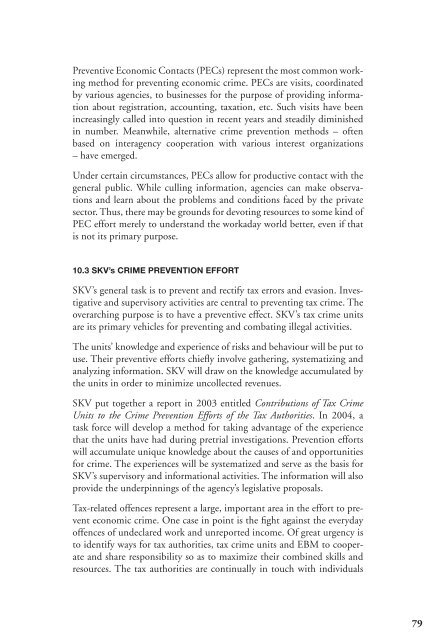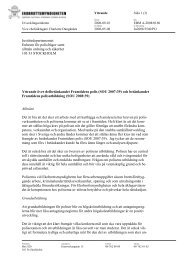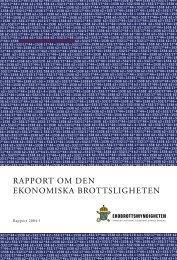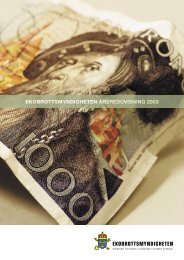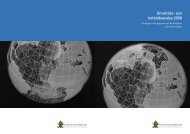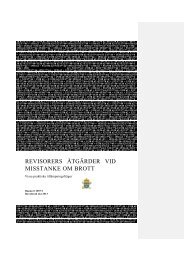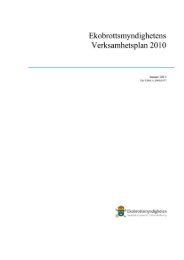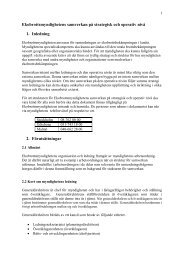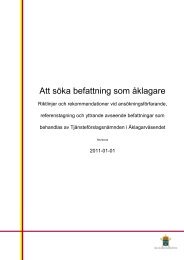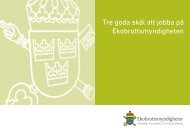Economic crime report 2004 - Ekobrottsmyndigheten
Economic crime report 2004 - Ekobrottsmyndigheten
Economic crime report 2004 - Ekobrottsmyndigheten
You also want an ePaper? Increase the reach of your titles
YUMPU automatically turns print PDFs into web optimized ePapers that Google loves.
Preventive <strong>Economic</strong> Contacts (PECs) represent the most common working<br />
method for preventing economic <strong>crime</strong>. PECs are visits, coordinated<br />
by various agencies, to businesses for the purpose of providing information<br />
about registration, accounting, taxation, etc. Such visits have been<br />
increasingly called into question in recent years and steadily diminished<br />
in number. Meanwhile, alternative <strong>crime</strong> prevention methods – often<br />
based on interagency cooperation with various interest organizations<br />
– have emerged.<br />
Under certain circumstances, PECs allow for productive contact with the<br />
general public. While culling information, agencies can make observations<br />
and learn about the problems and conditions faced by the private<br />
sector. Thus, there may be grounds for devoting resources to some kind of<br />
PEC effort merely to understand the workaday world better, even if that<br />
is not its primary purpose.<br />
10.3 SKV’s CRIME PREVENTION EFFORT<br />
SKV’s general task is to prevent and rectify tax errors and evasion. Investigative<br />
and supervisory activities are central to preventing tax <strong>crime</strong>. The<br />
overarching purpose is to have a preventive effect. SKV’s tax <strong>crime</strong> units<br />
are its primary vehicles for preventing and combating illegal activities.<br />
The units’ knowledge and experience of risks and behaviour will be put to<br />
use. Their preventive efforts chiefly involve gathering, systematizing and<br />
analyzing information. SKV will draw on the knowledge accumulated by<br />
the units in order to minimize uncollected revenues.<br />
SKV put together a <strong>report</strong> in 2003 entitled Contributions of Tax Crime<br />
Units to the Crime Prevention Efforts of the Tax Authorities. In <strong>2004</strong>, a<br />
task force will develop a method for taking advantage of the experience<br />
that the units have had during pretrial investigations. Prevention efforts<br />
will accumulate unique knowledge about the causes of and opportunities<br />
for <strong>crime</strong>. The experiences will be systematized and serve as the basis for<br />
SKV’s supervisory and informational activities. The information will also<br />
provide the underpinnings of the agency’s legislative proposals.<br />
Tax-related offences represent a large, important area in the effort to prevent<br />
economic <strong>crime</strong>. One case in point is the fight against the everyday<br />
offences of undeclared work and un<strong>report</strong>ed income. Of great urgency is<br />
to identify ways for tax authorities, tax <strong>crime</strong> units and EBM to cooperate<br />
and share responsibility so as to maximize their combined skills and<br />
resources. The tax authorities are continually in touch with individuals<br />
79


